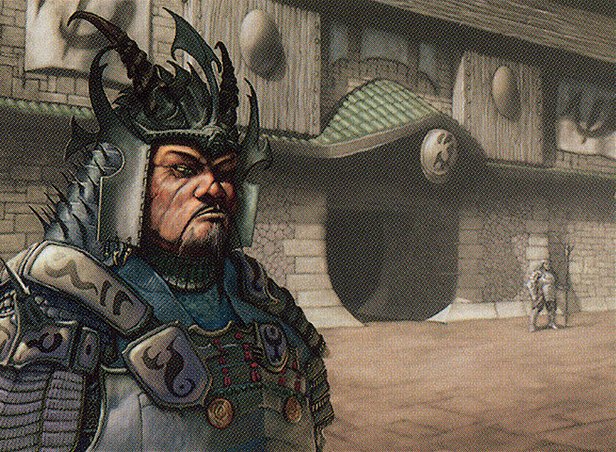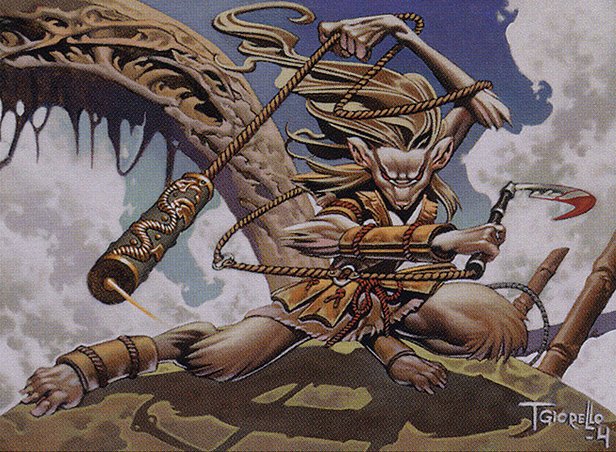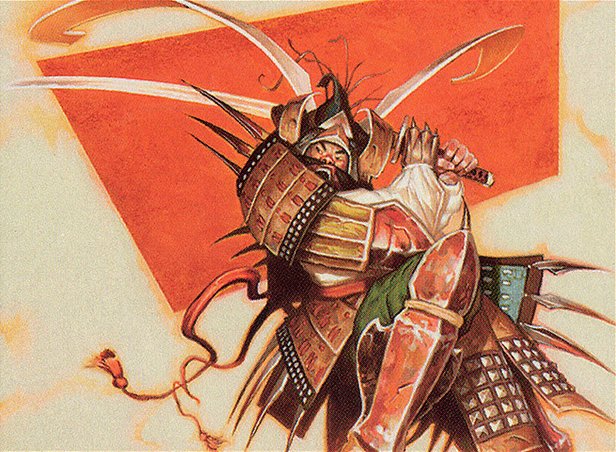Duty Bound
This content was deleted from the Magic website during an update. The original page can be accessed via Wayback Machine here.
By Ed Stark
The courtiers’ murmurs cut off instantly as the doors opened and Munetsugu Takeno strode into the great hall. Though he was in the heart of Eiganjo, inside an impenetrable fortress, and surrounded by the daimyo’s most loyal guards, Takeno always went fully armed. Oathkeeper, his katana and wakizashi, rode at his side and he wore the elaborately decorated do-maru armor and kabuto helm of the daimyo’s guard. The black-and-white motif appeared stark and plain against the opulence of the chamber, but Takeno’s stern face and dark hair and moustache kept even the most richly dressed from commenting on how a lord of the samurai should be dressed.

Takeno did not enter the hall alone. Two large samurai, dressed in similar garb but without helmets and carrying long naginata followed along behind. Officially, they were all part of the daimyo’s hatamoto, sworn to protect their lord from all danger and to enforce his laws. Unofficially, these two and four others were assigned as Takeno’s personal guardians. The daimyo favored Takeno in many things and the bodyguards were just more evidence of that.
The court recognized this favor and no one spoke as Takeno moved to the front of the hall. The daimyo’s great chair was empty, but the samurai moved to its right and stood there as if he were guarding his lord even now. Takeno’s own guards moved off to one side and stood quietly, watching.
“My lord?”
Takeno looked across the unoccupied great chair and barely restrained a sneer. If the samurai had to pick a favorite among the daimyo’s advisors, Atsumori Fushimi would not make even the first cut. His exalted birth and nothing else allowed him access to the court, and Lord Konda seldom let him sit in attendance. The daimyo had called Fushimi snake, and worm, and worse but had never officially censured him. The fact that he was present and dared talk to Takeno told the samurai the daimyo probably would not grace the court with his presence today.
But whatever Takeno thought of Fushimi, the samurai was a servant of his daimyo, nothing more. “Yes, sir?” he answered as gracefully as he could.
“My lord, a messenger has arrived from the village of Kodaira. It seems there is some trouble there. The villagers request assistance.”
“Kodaira?” The samurai lord stroked his cleanly-shaven chin. “Isn’t there an army outpost there?”
Fushimi nodded. “Yes, my lord,” he said, his voice syrupy enough to make Takeno wince in distaste, “a small outpost, to be sure. No more than twenty men. A mail-stop at best.”
“When did he arrive?”
The oily little courtier appeared to consider, then said. “I believe he arrived at dawn, my lord, or just after. He was quite a sight, my lord! Covered in mud and—”
“At dawn?!” Takeno roared. The court had just started to resume its normal background chatter but that halted suddenly. “Dawn?! That was two hours ago, you fool!”
Fushimi cringed and fell back from the samurai. His manner was so fearful that the two guards behind the samurai lord stepped up behind Takeno, certain some sort of violence was imminent. Takeno cursed his intemperate nature and struggled to keep his voice calm and even.
“Why did no one tell me immediately?” he asked, his voice quiet but sounding like wagon wheels on gravel.
“It … it’s just an outpost, my lord. No one wanted to disturb you,” Fushimi gabbled quickly. Then he pointed off to a door at the right of the hall. “My lord, he is in the antechamber, if you wish to see him yourself.”
“Of course I want to see him myself!” Takeno swept past the small, cringing man and his guards followed along in his wake. He fumed internally. There were procedures to be followed, orders to be obeyed. If Fushimi were under his command, he’d have his head off his shoulders in no time!
But he isn’t under your command, you fool! The samurai reminded himself. Orders and procedures meant little to the idiot courtier, but they were Takeno’s lifeblood. He jerked open the door, seething in fury at the lack of discipline he had to put up with around the palace. He would speak to Lord Konda about it. He would—
The daimyo’s great hall had many antechambers set aside for private conferences. Some, like this one, had separate passages off into other areas of the castle. This one, he believed, had a direct route to the kitchen. That belief was confirmed when he saw a young man, caked in dried mud but wearing the uniform of a provincial soldier sitting at a table chewing tiredly on a rice ball.
The sight brought Takeno up short and he saw a red haze start to form before his eyes. The young soldier looked up from his Spartan meal, saw the samurai’s leveled gaze, and leapt to his feet with such suddenness that his chair tipped over behind him. The man blushed scarlet and turned to pick up the chair but then thought better of turning his back on a man dressed in the armor of the daimyo’s personal guard. He jerked himself upright and stood rigid, not even daring to swallow the rice still stuck in one cheek.
Takeno swept into the room right up to the young soldier.
“Is this how you present yourself to a superior, boy?” he asked in a dangerously low tone of voice.
The boy looked miserable. His face, it turned out, was clean, as were his hands. He choked slightly as he tried to answer.
“Swallow,” the samurai said evenly, picking up a bowl of water and handing it to him.
The boy took the water, swallowed the rice, and washed it down quickly, never quite relaxing from his rigid stance.
“So, you’d rather eat than make yourself presentable to a superior officer? Answer, boy!”
“No, sir! I mean, sir …”
“Out with it!” Takeno snarled.
The boy hesitated, glanced at the samurai, then plowed forward. “My lord, I was brought here to report. No one came except one maid with this rice and water. I tried to clean up some, sir ….” The boy started to hold his hands up as evidence but Takeno’s frown deepened.
But the red haze faded. The boy’s uniform was that of a hikyaku—light armor, leather pants with a reinforced seat, and a sash that would normally have held a horse bow or perhaps a lance. No one but the daimyo’s personal guard went armed inside the palace, however. Despite the mud, however, the boy’s gear was in good repair and Takeno grunted.
“All right. But don’t ever forget the uniform code, boy. Take care of your gear and it’ll take care of you. Now, sit down and tell me what’s going on in Kodaira.”
The young man hesitated but when Takeno pulled up a short stool and sat he righted his chair and joined the samurai. He still sat rigid and away from the table, obviously ignoring the plain food he’d been so intent on moments before.

“Yesterday evening a strong band of nezumi attacked the village,” the young man began. Takeno heard one of his bodyguards suck in a breath and made a mental note to speak to the man later. Bodyguards were there to protect their charge, not overhear conversations, no matter how shocking. “They came in force and we had no warning. Before we could respond, they had occupied the village and killed many of the townsfolk.”
“How did they get past your scouts?” Takeno asked, almost casually.
His estimation of the young soldier went up considerably as the tired man responded in a defensive tone, “We don’t know, my lord. Captain Matsuda had the requisite number of pickets out but they must have either slipped by or somehow killed them without warning. The Captain advised me to report he feared there might be magic involved but that he had no first-hand evidence.”
Takeno nodded, listening carefully. “Good. It’s too easy to blame magic when something goes wrong. Rat-men are born sneaks; if they crept up from the river I suppose it’s possible they managed to take out the closest pickets without alerting the others. Go on,” he ordered.
“Captain Matsuda sent out three couriers to request aid. I … I don’t know what happened to the others, but I made it here in just under four hours.”
The samurai was impressed. Kodaira was a day’s ride from the Araba. At night, pursued by nezumi who could see—or smell—in the dark, it should have taken twice that long. This young man was something special.
But that was for another time. Takeno pondered the situation. “If we ride now, we can press on and make it there just after midday,” he mused. “It won’t be in time to save the village, but …”
“My lord,” the young soldier interrupted. “My lord, it might. Captain Matsuda ordered the villagers into the outpost. Most of them got in before the nezumi swarmed the town.”
“What?!” The samurai leapt to his feet. Before the young man could answer, Takeno turned and stabbed one finger at a bodyguard. “Get the guard together! Get horses! We’re riding out in one hour!”
* * *
Takeno rode at the head of twenty-four of the daimyo’s hatamoto. A twenty-fifth rider accompanied him. Despite his fatigue, the young soldier—whose name was Shiro—insisted on accompanying the troop. The samurai respected the young man’s zeal and provided him a new horse and a clean uniform.
According to Shiro’s report, at least four score nezumi had attacked the village. It was possible more could have come in the night, but Takeno had fought rat-men before. If they went to the trouble of an all-out raid, they’d swarm the village and try to take the fort through sheer numbers. If eighty nezumi had attacked, then eighty nezumi were all they had.
And twenty-four of the daimyo’s best samurai were more than a match for them.

Takeno reflected on his command as they neared the approach to Kodaira. Six of his soldiers bore the long hankyu once scorned by samurai but embraced by Takeno as a fine alternative to fighting up close. The arrows fired from the hankyu could pierce the best do-maru armor and his archers did not miss.
The rest of his men had long pikes or naginatas. They would charge into the village and spear any nezumi they caught in the open, then sweep out their swords and finish their work on the ground.
Takeno himself wore the horo of the daimyo’s guard. He would ride at the front of his men and no rat or man would stand before him. It was not an elegant plan, but it was direct.
The charge began just before the town gate. The nezumi liked the darkness and the daimyo’s guard arrived in the heat and light of midday. They swept down out of the wood and rode along the water’s edge. By the time the nezumi guards realized what had happened, each had two leaf-edge arrows blossoming from its chest.
The daimyo’s guard swept into the village without a word. Takeno had learned long ago that a kiai shout was good for focusing one’s personal attack during battle, but the longer a charge could be kept silent, the more it unnerved his opponents. In this case, the lack of a war-cry served a double purpose as the nezumi standing just outside of bow-shot of the outpost’s walls never heard them coming. Even the sound of twenty-five horses’ hooves on the soft ground of the village streets didn’t carry to the jeering, shouting rat-men besieging the small fort.

A nezumi turned at the last second and Takeno saw its bright, red eyes widen (as much as a rat’s could widen) in fear. Then his katana swept down and bit deep into the rat’s neck. Blood fountained upward as the nezumi fell back and the veteran samurai twisted his blade out easily as his horse trampled the black body into the mud.
His warriors were everywhere. The archers had dismounted and were firing fast into the nezumi’s ranks. Though there were only six archers it looked as if an army’s worth of arrows arched down on the stunned rat-men.
Takeno’s own guards flanked him and they showed their superior horsemanship, twisting this way and that, slashing or stabbing with their long naginatas. The long spears were not well suited to use on horseback but every man who trained with Takeno learned how to fight and ride at the same time, no matter the weapon.
The samurai finally let out his own war cry and that signaled the kiai shouts of his men. Most laid about them with their katana but a few actually dismounted to better strike at the shorter, quicker nezumi. They fought in pairs and quads, as Takeno had taught them, and he had a sudden burst of pride as he watched.
But that pride turned to pain as something struck the back of his helmet. The kabuto protected his neck but he grunted and fell backward out of the saddle, stunned. He hit the soft ground hard. Trying to rise, he slipped and felt something hard and hairy land on his chest.
“Die!” the creature spat, raising a hooked kusari-gama. In a brief moment of intellectual detachment, Takeno realized it was the weighted chain at the end of the bladed weapon’s handle that must have struck him. The blade came down toward his face.
But the point never landed. A brown shape dove from the left and struck the nezumi across the side. The tackle drove the creature off the samurai and Takeno struggled up on one elbow. There, to his right, Shiro rolled in the dirt, wrestling with the nezumi thug.
Takeno struggled to his feet, still slightly dazed. He drew his wakizashi—his katana had flown who knew where—and started forward. The boy and the rat-man were intertwined, both biting, stabbing, and wrestling in the mud. The samurai looked for a way to stab at the hairy creature without hurting the boy when a horn blew.
Looking up, the samurai saw the gate to the outpost fly open. A small band of armed men and women flowed out and down the hill. There couldn’t have been more than twenty of them, but combined with the sudden strike of the daimyo’s guard, they were enough. The nezumi that could still walk ran and fled toward the river.
When Takeno looked back, however, he saw the sortie had come too late. The nezumi’s blade had pierced Shiro’s chest and the boy was dead. He’d taken his enemy with him, though—the dying young soldier had clutched his foe to him, driving the blade up through the rat’s chin and into his brain. Takeno bent down.
“My lord!”
The samurai looked up and straightened. A dark man, his hair cut into a warrior’s topknot and his face clean-shaved, strode toward him. He had blood on his sword but he wiped it on a rag and deftly sheathed the weapon as he approached.
“My lord Takeno, I presume?” He asked.
“I am,” the samurai answered.
The man bowed deeply. “My lord, I am Captain Matsuda, commander of the Kodaira outpost.” He glanced over at the entwined bodies and started. “I … I see Shiro found you, my lord,” he said haltingly.
“He did, Captain,” Takeno said coldly. “He did his duty. Which is more than I can say for you.”
The captain looked up, startled. “My lord—”
“Captain,” Takeno interrupted harshly, anger evident in his voice. “You were placed in charge of one of Konda-sama’s outposts. That fort is the daimyo’s land. Who gave you permission to allow the villagers inside?”
“My lord? I thought, to save the village, my lord …” the man stammered in disbelief.
Takeno looked around. Many of the huts of the village were still intact, but many more had been burned. All had been ransacked. “You know the rules, Captain. Arrest him.” The samurai lord’s guards stepped forward and took the stunned man’s arms, leading him up into the fort.
Takeno stepped over to the bodies lying on the ground and kicked the rat-man away from its death-grip on Shiro. He laid the young boy on his back and arranged him carefully. “Yes,” he muttered to himself, “you know the rules.”
